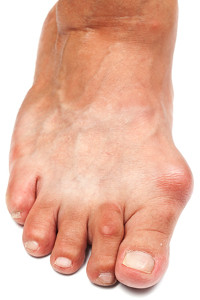If you have a bony protrusion at the base of the big toe, you most likely have a bunion. It is considered to be a deformity of the joint in that area of the toe. The symptoms that many patients notice often include skin that is sensitive on top of the bunion, and changes to the shape of the foot. Additionally, pain, swelling, and callused skin can accompany this condition. Research has indicated bunions may be caused by genetic factors and wearing shoes that do not fit correctly can make bunions worse. Mild relief may be found if bunion pads or orthotics are worn. If this is ineffective, surgery may be necessary if permanent removal of the bunion is desired. If you have developed a bunion, it is advised to seek the counsel of a podiatrist who can guide you toward the treatment that is right for you.
If you are suffering from bunion pain, contact Dr. Tupper of Coshocton Foot Health Center. Our doctor can provide the care you need to keep you pain-free and on your feet.
What Is a Bunion?
Bunions are painful bony bumps that usually develop on the inside of the foot at the joint of the big toe. As the deformity increases over time, it may become painful to walk and wear shoes. Women are more likely to exacerbate existing bunions since they often wear tight, narrow shoes that shift their toes together. Bunion pain can be relieved by wearing wider shoes with enough room for the toes.
Causes
- Genetics – some people inherit feet that are more prone to bunion development
- Inflammatory Conditions - rheumatoid arthritis and polio may cause bunion development
Symptoms
- Redness and inflammation
- Pain and tenderness
- Callus or corns on the bump
- Restricted motion in the big toe
In order to diagnose your bunion, your podiatrist may ask about your medical history, symptoms, and general health. Your doctor might also order an x-ray to take a closer look at your feet. Nonsurgical treatment options include orthotics, padding, icing, changes in footwear, and medication. If nonsurgical treatments don’t alleviate your bunion pain, surgery may be necessary.
If you have any questions, please feel free to contact our office located in Coshocton, OH . We offer the newest diagnostic and treatment technologies for all your foot care needs.

